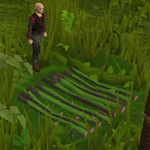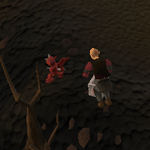Hunter - Getting Started
Introduction | Getting Started | Bird Snaring | Tracking | Butterfly Netting
Deadfall | Box Trapping | Rabbit Snaring | Net Trapping | Pitfall Traps | Falconry | Magical Imp Box | Notes
Deadfall | Box Trapping | Rabbit Snaring | Net Trapping | Pitfall Traps | Falconry | Magical Imp Box | Notes
Introduction

Getting Started
It may be worth going to either the Rellekka Hunter area or Feldip Jungle first; at the Rellekka area you will find polar kebbits, which can be 'tracked' (see below), while the Feldip Jungle has the crimson swift, a red bird that can be found on the shoreline of the Hunter area. Each of these need level 1 Hunter, and are thus the perfect starting point for an enthusiastic rookie.
Once there it is time to embark on your Hunter career - a career that will involve stealth, patience, camouflage and more than a little bravery. For any additional help, talk to the Hunter guides at the north of the Trollweiss and Rellekka area, or the west side of the Feldip Jungle area. Otherwise, the Game Guide has a series of pages that can help you with each individual Hunter endeavour.
The following descriptions will give you an idea of what to expect from each Hunter type.
Bird Snaring

A bird snare should be laid in an area with many birds circling above for maximum results. Once caught, a bird will leave feathers that can be used when Fletching or even for catching the fabled 'rainbow fish'.
This trap can be smoked with a torch at level 39 Hunter.
For a more detailed look at this Hunter technique, visit the Hunter - Bird Snaring page.
Tracking
Tracking targets all start from a burrow in the ground, such as the one below.

'Inspecting' the hole will reveal a path of pawprints away from it. This path will show the direction that the creature went, and you should follow that trail. It is up to you to 'search' the bushes, grass, cacti, disturbed sand and logs, amongst others, surrounding the path to see where that animal went to next. Sometimes the tracks will even loop - wily kebbits - and you will still have to search the surrounding areas. Don't worry - there will still be a kebbit reward at the end!
Keep searching - sometimes the next piece of bush, grass, log, etc, may well be quite a way away from the original tracks.
The path will always end with a kebbit hiding area, and a search of the final spot will bring up a message in the chat window of the interface.
It is now time to use your noosing wand, bought from any good Hunter store. Using it on the hole, or 'attacking' the hole with a noose wand wielded, will, with any luck, catch the creature - leaving you with a series of items that can be used later on! A warning, however - logging out will cause your tracks to disappear and you will have to start again!
Additionally, tracking creatures will drop kebbit fur, ideal for fashioning into camouflaged Hunter clothing! This clothing will aid you specifically in those areas where the animal-skin was gleaned. A polar kebbit, tracked in polar regions, will increase your chance of Hunter success in polar regions. A full-set of polar-camouflage clothing will increase that chance even further! (See the Hunter - Equipment page for more information on making these.)
For a more detailed look at this Hunter technique, visit the Hunter - Tracking page.
Butterfly Netting

Caught by left-clicking when holding a net and with an empty butterfly jar in the inventory, the butterflies of RuneScape hold magical properties and can be unleashed on other players in multi-way combat areas for positive effects.
For a more detailed look at this Hunter technique, visit the Hunter - Butterfly Netting page.
Deadfall

See the Hunter Equipment Table to see what these items are and how they can be used.
This trap can be smoked with a torch at level 39 Hunter.
Deadfall kebbits will be drawn to the trap by their specific baits. For a more detailed look at this Hunter technique, visit the Hunter - Deadfall page.
Box Trapping

To set the trap you must first lay the box and then open it up ready for catching the creature. It is wise not to lay the trap and move away quickly, as the trap will not be properly set. Once opened it is possible to bait the trap - chinchompas love spicy mincemeat and spicy tomato, while ferrets love raw meat - and move away, awaiting a curious creature to walk inside.
This trap can be smoked with a torch at level 39 Hunter.
For a more detailed look at this Hunter technique, chinchompas and ferrets, visit the Hunter - Box Trapping page.
Rabbit Snaring

These ferrets, once caught via a box trap (also requiring level 27 Hunter), will become invaluable to you when rabbit snaring. A rabbit snare, bought from the Hunter stores of Yanille and Nardah, will also be required for your first rabbit snare.
Once these two have been collected, it is time to travel to one of the rabbit burrow areas in the Piscatoris Hunter area. These are recognisable by the pattern of six burrows, all facing towards each other.
To catch the rascally rabbit, you will need to lay a rabbit snare in the area that the burrows face (though it is advised to lay as many as your level allows; see the Hunter - Rabbit Snaring page to see how many you can lay at a time). Once this is done, simply 'use' the ferret on a rabbit hole, and wait to see if the blindingly fast rabbits get caught in one of your snares. They streak across the area randomly, so you may not be lucky every time.
This trap can be smoked with a torch at level 39 Hunter.
Net Trapping

This trap can be smoked with a torch at level 39 Hunter.
Stepping away from the trap, you can catch these reptiles and amphibians for later use as a two-handed Ranged weapon!
Go to the Hunter Locations page for salamander and swamp lizard locations, as they are often found away from the Training Areas, in more hazardous locations.
For a more detailed look at this Hunter technique, visit the Hunter - Net Trapping page.
Pitfall Traps

Pitfall traps use the pits in the ground that dot the landscape around pitfall targets. These dips can be changed into spiked pits with the simple use of logs from a tree and a knife in your inventory. The difficult part comes next, just in case you felt this was too easy.
With the aid of a teasing stick, bought from any Hunter store, a particularly brave hunter can prod a creature and cause it to run after him or her. If that brave hunter happens to be you, make sure you lead it toward your pitfall and then jump over. With any luck (and a high Hunter skill) the beast should fall into your spike trap, leaving it ready to have its hide gleaned.
These hides can be made into animal-skin clothing for aiding you with hunting, more specifically in those areas where the animal-skin was gleaned. A sabretooth kyatt, trapped in polar regions, will increase your chance of Hunter success in polar regions. A full-set of kyatt-skin clothing will increase that chance even further! (See the Hunter - Equipment page for more information on making these.
For a more detailed look at this Hunter technique, visit the Hunter - Pitfall Trapping page.
Falconry

To have a go with the falcon, you will need to pay its owner 500gp for the privilege. When holding the bird, left-click on one of the kebbits in its enclosure to cause the falcon to fly speedily towards it and hold it down with its talons. A swift walk to the downed kebbit will produce various pelts that can be used to create lightweight clothing for furthering your other skills.
For a more detailed look at this Hunter technique, visit the Hunter - Falconry page.
Magical Imp Box

These two requests for banking items in your inventory can be used separately, or together, if you wish. More than one boxed imp can be contained in your inventory at a time.
For a more detailed look at this Hunter technique, visit the Hunter - Magical Imp Boxes page.
Notes
Smoking traps
A creature can be put off by your appearance and smell. Smoking a trap (level 39) will remove your scent from it, so that the creature will feel less like it is being lured somewhere it shouldn't be! To smoke the trap you will need a torch, bought from your local Hunter store, and a Hunter level of 39. Lighting the torch and using it on a selected few of your traps will increase your chances of Hunter success. The traps that can be smoked are bird snares, deadfalls, box traps and net traps.
Camouflaging
Finally, your appearance can often be enough to stop an animal walking into a trap. Don't take it personally - a creature just feels slightly wary when humans are about. Walking far enough away or hiding behind an obstacle is normally enough to help trap a creature, while wearing camouflaged outfits garnered from Hunter creatures of that area (jungle camo-tops for the jungle, for example) will also increase your chances of success. A full suit of a specific animal's fur (headdress, top and trousers) will give an additional boost to your Hunter potential.

More articles in
Hunter
|
|

